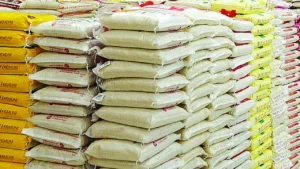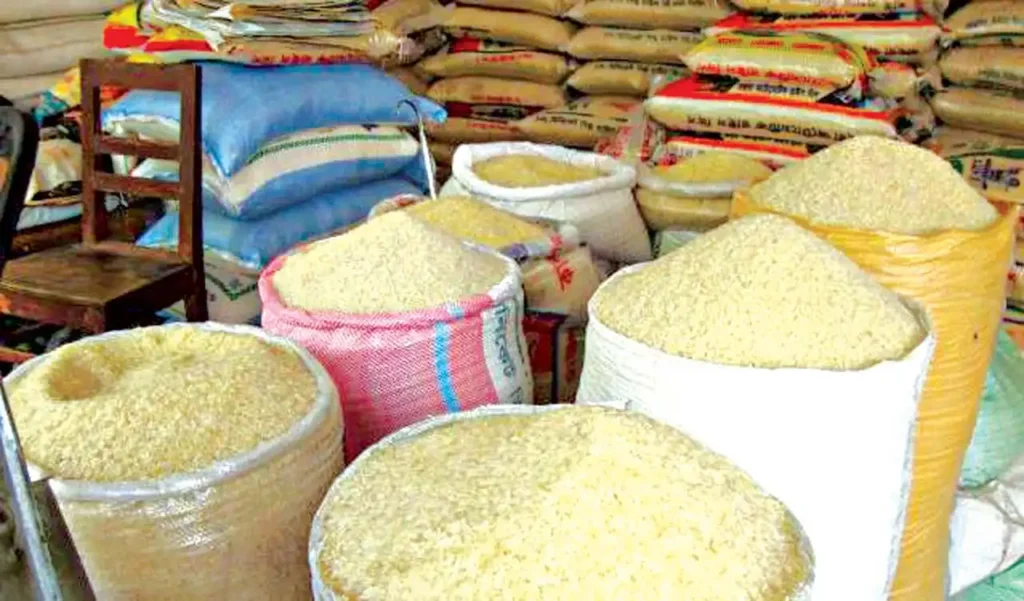An undercover investigation has uncovered a well-entrenched syndicate operating along Nigeria’s western border — specifically from Benin Republic through Kwara State — where smugglers, customs officers, and local collaborators sustain a thriving illegal rice importation network. The scheme not only weakens local rice production but also drains government revenue, undermines national food policy, and endangers border communities.
Conducted by investigative journalist Salihu Ayatullahi, this report reveals how corrupt border agents, backdoor border corridors, and political protection fuel a booming black-market economy centered on smuggled foreign rice.
A Network Rooted in Complicity
Despite Nigeria’s ban on rice imports through land borders — a policy introduced to support local farmers and encourage self-sufficiency — the illegal flow of foreign parboiled rice persists. Kwara State, which shares an extensive border with Benin Republic, has become one of the primary channels for this unlawful trade.
Ayatullahi’s months-long surveillance of illicit routes in Baruten and Kaiama Local Government Areas exposed how smugglers routinely evade checkpoints with the help of compromised officials. “At night, convoys of motorbikes and trucks loaded with foreign rice cross over through unmanned bush paths, and in some cases, customs officers escort them through,” one whistleblower revealed.
These operations reportedly involve a wide network of actors — from local border residents and drivers to security officials and political middlemen. “Without the complicity of those tasked with protecting Nigeria’s border integrity, this system would collapse,” the source emphasized.

Benin Republic: A Gateway for Contraband
The Beninese side of the border, particularly the towns of Kabo and Malanville, has evolved into thriving hubs for rice smuggling. Foreign brands such as “Caprice,” “Royal Stallion,” and “Falcon” are stockpiled in hidden warehouses, ready for illicit entry into Nigeria. These warehouses are guarded by private militia, often under the protection of local authorities who profit from the trade.
Nigerian buyers often make payments in Cotonou, and smugglers coordinate night deliveries through encrypted WhatsApp groups. Some are armed, posing a grave security risk to communities caught between state enforcement and criminal operations.
Local Farmers Suffer the Fallout
For rice farmers in Nigeria’s North Central region, especially Kwara and Niger States, the unchecked inflow of cheaper smuggled rice has been economically devastating. “We cannot compete with subsidized or dumped rice entering illegally. Our markets are flooded with it,” lamented Yusuf Ibrahim, a rice farmer in Patigi, Kwara.
He said despite government support through programs like the Anchor Borrowers’ Scheme, the illegal competition pushes local farmers out of business. “It’s not just about prices — the trust of the market is also lost,” he added.
Complicit Officers and Bribery Culture
According to Ayatullahi’s findings, some customs officials posted to key checkpoints in Gwanara, Ilesha Baruba, and Chikanda routinely collect bribes in exchange for free passage of contraband-laden trucks. Several videos and photographs documented officers turning a blind eye as smugglers drove past.
An ex-officer, who spoke anonymously, explained how the corruption works. “It’s organized. Every unit — from local patrols to supervisory ranks — receives a cut. That’s why whistleblowing rarely works. You’re reporting to the same people who benefit.”
Moreover, some officers engage in “interception laundering” — seizing rice publicly for media attention while allowing larger quantities to pass quietly elsewhere.
Communities Trapped Between Poverty and Crime
Border communities have become entangled in the syndicate’s grip, often participating in smuggling due to poverty and limited economic alternatives. “Many youths are paid ₦1,000 per night to transport 50kg bags across dangerous terrain. They are exposed to gun violence, accidents, and snakebites,” a community leader in Okuta explained.
Traditional rulers and local government officials often keep silent or openly support smuggling operations, especially during election seasons when smugglers act as political foot soldiers.
Customs and Government Response — Too Little, Too Late?
The Nigeria Customs Service (NCS) has repeatedly announced seizures and anti-smuggling operations in the North Central zone. However, insiders suggest that most arrests are of low-level couriers while the key sponsors remain untouched. Critics argue that the agency’s efforts amount to damage control rather than systemic reform.
Attempts by the Federal Government to digitize border monitoring through drones and electronic surveillance have seen limited success due to sabotage and poor maintenance.
Policy Gaps and the Need for Reform
Experts argue that until the structural corruption within border enforcement agencies is addressed, Nigeria’s food security goals will continue to be undermined. They call for:
-
Transparent deployment of customs officers with regular rotation
-
Livelihood programs for border communities to reduce smuggling incentives
-
Stronger regional cooperation with Benin Republic to shut down contraband warehouses
-
Independent anti-corruption audits of customs posts
Dr. Hassan Mohammed, a trade and border policy expert, summed it up: “You can’t build a rice economy on porous borders and weak enforcement. What we’re seeing in Kwara is not just smuggling — it’s economic sabotage.”
Conclusion: A Call to Break the Cycle
This investigation reveals that the illegal rice trade through Kwara is not a scattered crime but a coordinated industry with protection from within. Unless urgent reforms target both the economic drivers and corrupt enablers of this network, Nigeria’s dream of food self-sufficiency will remain out of reach — and its borders, vulnerable to deeper insecurity.





